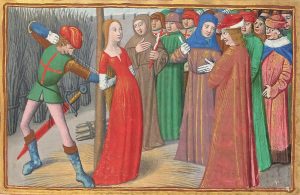Joan of Arc’s death was a tragic event in the history of France and the world. She was a young woman who inspired an entire nation to stand up against their oppressors, but her bravery and devotion ultimately led to her execution by burning at the stake.
Early Life and Visions
Joan of Arc was born in 1412 in Domrémy, a small village in northeastern France. She grew up during a time of great unrest in the country, as the Hundred Years’ War between France and England raged on. At the age of 13, Joan began to have visions that she believed were messages from God. In these visions, she saw herself as a savior of France, sent by God to lead the French army to victory over the English.
Military Victories and Capture
In 1429, Joan of Arc traveled to the city of Orléans, which was under siege by the English. She convinced the commander of the French army to allow her to lead a charge against the English, and her leadership and bravery helped to secure a decisive victory for the French.
However, Joan’s success also made her enemies. The English and their French collaborators saw her as a threat, and they conspired to have her captured and tried for heresy. In May 1430, Joan was captured by the Burgundians, a faction allied with the English, and she was sold to the English for a large sum of money.
Trial and Conviction
Joan of Arc was put on trial by an ecclesiastical court in Rouen, France, in early 1431. She was accused of dressing in men’s clothing, claiming to receive divine revelations, and leading armies in battle, all of which were considered violations of church law. Despite her vehement protests of innocence, she was found guilty and sentenced to death.
Execution and Legacy
On May 30, 1431, Joan of Arc was taken to the marketplace in Rouen, where she was tied to a pillar and surrounded by a large crowd of onlookers. As the flames were lit, she called out for the name of Jesus and reportedly continued to do so until her death.
The circumstances of Joan of Arc’s trial and execution have been the subject of much debate and speculation over the years. Some historians argue that she was a victim of political and religious manipulation, while others suggest that she may have suffered from mental illness or other psychological disorders. In the years following her death, Joan of Arc became a symbol of French nationalism and a martyr for the Catholic Church. Her story inspired countless works of art and literature, including plays by Shakespeare and George Bernard Shaw, and her legacy continues to be celebrated in France and around the world.
In 1456, a retrial was held, and Joan of Arc was exonerated of all charges. In 1909, she was beatified by the Catholic Church, and in 1920, she was canonized as a saint. Today, she is remembered as a symbol of courage, faith, and resilience, and her life and death continue to inspire people to stand up for their beliefs and fight for justice, even in the face of overwhelming opposition.
